HISTORY |
 |
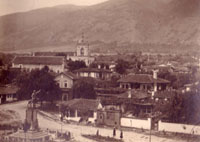 Karlovo, the birthplace of the Apostle of Bulgarian freedom and founder of the Internal Revolutionary Organisation Vassil Levski (1837-1873), is situated in the northern part of the Karlovo valley, which in the past was called Stryamska or Gyopsa. The town of Karlovo is 56 km away from Plovdiv, the regional centre, and 147 km to the east of Sofia, the capital of Bulgaria. Karlovo, the birthplace of the Apostle of Bulgarian freedom and founder of the Internal Revolutionary Organisation Vassil Levski (1837-1873), is situated in the northern part of the Karlovo valley, which in the past was called Stryamska or Gyopsa. The town of Karlovo is 56 km away from Plovdiv, the regional centre, and 147 km to the east of Sofia, the capital of Bulgaria.Since early times, all geographers and travellers passing through the town have been impressed by its beautiful location and the Old River (Stara Reka) gorge. The earliest traces of life here date back to the Neolithic (New Stone Age) /6000 years B.C. /. In the area Yasa in the west of the town a Neolithic settlement has been found. According to the research-workers, Thracian tribes, which inhabited the lands around today’s Karlovo in the Late Iron Age / 6th century B.C. – 1st century A.D. /, belonged to the Odrisi ethnic group. 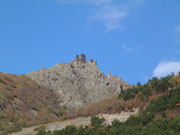 In the Roman and the Late Ancient Age in the north of the settlement the sub-Balkan Roman road, which connected the Black sea coast and Serdika, passed. In order to guard the road and the settlements near it, a lot of fortresses were built. One of them is the Karlovskoto stronghold, which is situated in the north of the town above the Bej Bunar Park and dates back to 4th-6th century. Another fortress is the Sushitskoto stronghold-situated in the east of the present quarter Sushitsa, which existed up to 12th -14th century. In the Roman and the Late Ancient Age in the north of the settlement the sub-Balkan Roman road, which connected the Black sea coast and Serdika, passed. In order to guard the road and the settlements near it, a lot of fortresses were built. One of them is the Karlovskoto stronghold, which is situated in the north of the town above the Bej Bunar Park and dates back to 4th-6th century. Another fortress is the Sushitskoto stronghold-situated in the east of the present quarter Sushitsa, which existed up to 12th -14th century.In the 13th century these lands were part of the family estates of the three Bulgarian boyars - Smilets, Radoslav and Voysil. Near the present town some settlements and fortresses from that period existed – the stronghold above the “St. Trinity” (Sv. Troitsa) chapel and a settlement north-east of Karlovo. In the 70s of the 14th century Karlovo Valley was conquered by the Ottoman Turks. In the end of the 15th century Sultan Bayazid II gave the Ottoman Military Leader Karla Ali Bey the village of Sushitsa and the belonging lands. In 1485 Karla Bey built the Bullet Mosque (Kurshum Dzhamiya)-the oldest architectural monument in the town and bequeathed the land to the people of the settlement for maintenance of the mosque. The name Karlovo became known in a later period, after the Turkish invasion, and probably comes from the name Ali Bey, Karla’s son. 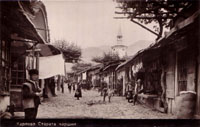 The town of Karlovo reached a peak in its economic, spiritual and cultural flourishing during the Bulgarian Revival. Here over 30 types of crafts were developed - rose oil production, woollen braiding, cotton printing, weaving, leather manufacture, coppersmith's trade, goldsmith's trade and many others. The big merchants Pulevi, Geshovi, Hadjidimitrovi traded with big quantities of the Karlovo craftsmen’s products at all markets in the Ottoman Empire, Wallachia (Romania), Moldavia, Russia, France, England etc. The town of Karlovo reached a peak in its economic, spiritual and cultural flourishing during the Bulgarian Revival. Here over 30 types of crafts were developed - rose oil production, woollen braiding, cotton printing, weaving, leather manufacture, coppersmith's trade, goldsmith's trade and many others. The big merchants Pulevi, Geshovi, Hadjidimitrovi traded with big quantities of the Karlovo craftsmen’s products at all markets in the Ottoman Empire, Wallachia (Romania), Moldavia, Russia, France, England etc.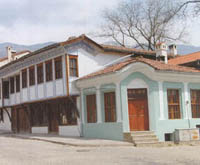 In the middle of 19th century two churches were built – the “St. Virgin Mary” church (Sv. Bogoroditsa) /1839/, where Vassil Levski was ordained as a hierodeacon and “St. Nikolai” (Sv. Nikolai) church /1847/, where in 1858 for the first time the Celebration of the Slavonic Writing was commemorated. Vassil Levski’s mother, Gina Kuncheva, was buried in the churchyard of the “St. Nikolai” church. The two churches were built by master-builders from Karlovo and Bratsigovo and the icons, which are pieces of art, were created by renowned artists from Samokov, Tryavna and Bansko, among whom were Stanislav Dospevski and Ivan Zografski. In the middle of 19th century two churches were built – the “St. Virgin Mary” church (Sv. Bogoroditsa) /1839/, where Vassil Levski was ordained as a hierodeacon and “St. Nikolai” (Sv. Nikolai) church /1847/, where in 1858 for the first time the Celebration of the Slavonic Writing was commemorated. Vassil Levski’s mother, Gina Kuncheva, was buried in the churchyard of the “St. Nikolai” church. The two churches were built by master-builders from Karlovo and Bratsigovo and the icons, which are pieces of art, were created by renowned artists from Samokov, Tryavna and Bansko, among whom were Stanislav Dospevski and Ivan Zografski.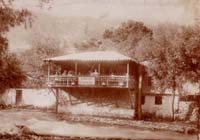 Hard working and enterprising in various spheres of economy, the people from Karlovo also showed a big initiative in the field of enlightenment and education. The earliest rudiments of an educational movement in Karlovo date from 17th century when the priest Avram Dimitriecich worked here as an honourable scholar and a teacher. An epoch in the educational work here is the deed of the teacher and the scholar Rayno Popovich /1773 – 1858/, the brightest figure in the spiritual revival of the town. In 1836 the people from Karlovo constructed a new building for the mutual school and in 1871 a spacious 5-class school was opened. In 1861 the community cultural club in Karlovo was created, which became a centre of education and revolutionary ideas. Hard working and enterprising in various spheres of economy, the people from Karlovo also showed a big initiative in the field of enlightenment and education. The earliest rudiments of an educational movement in Karlovo date from 17th century when the priest Avram Dimitriecich worked here as an honourable scholar and a teacher. An epoch in the educational work here is the deed of the teacher and the scholar Rayno Popovich /1773 – 1858/, the brightest figure in the spiritual revival of the town. In 1836 the people from Karlovo constructed a new building for the mutual school and in 1871 a spacious 5-class school was opened. In 1861 the community cultural club in Karlovo was created, which became a centre of education and revolutionary ideas.Karlovo is the birthplace of Botyo Petkov – a notable teacher, a scholar and a publicist, Hristo Botev’s father - the immortal poet and revolutionary, Dr. Ivan Bogorov – a publicist, an translator and a publisher of the first Bulgarian newspaper - Bulgarian Eagle, Brayko hadji Genov – a teacher, a folklore researcher, an organizer of the first Public library in Karlovo, Hristo pop Vasilev – a translator, the creator of the Girls school in Karlovo, the Evlogi and Hristo Georgievi Brothers – the greatest benefactors in Bulgarian history and many others. 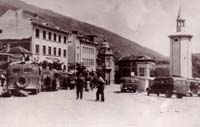 After the Liberation, the town passed through a period of economic decline but it also had years of material and cultural progress. In 1892 Karlovo took part in the first Plovdiv exhibition. The pavilion was built with Evlogi Georgiev’s finances and in it products of the local industry and crafts were exposed. Gold medal was awarded to Hristo Djapunov for his invention – a machine for shoe-pegs. In 1926 one of the first hydroelectric power-stations in Bulgaria – VETS Stara Reka (Old River) was built in Karlovo, in 1933 wine-cellar was created, banks, factories and schools were built. After the Liberation, the town passed through a period of economic decline but it also had years of material and cultural progress. In 1892 Karlovo took part in the first Plovdiv exhibition. The pavilion was built with Evlogi Georgiev’s finances and in it products of the local industry and crafts were exposed. Gold medal was awarded to Hristo Djapunov for his invention – a machine for shoe-pegs. In 1926 one of the first hydroelectric power-stations in Bulgaria – VETS Stara Reka (Old River) was built in Karlovo, in 1933 wine-cellar was created, banks, factories and schools were built.The development of Vassil Levski’s birth-town after the Second World War was dynamic and it turned into an important industrial, military, transport and cultural centre. Karlovo has given its contribution to all spheres of Bulgarian public life, art and science. 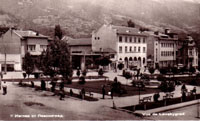 Among the most famous firms are: VMZ-Sopot (Military Machine Building Plant-Sopot), Tractor Factory –Karlovo, Bulgarska Rosa-Karlovo (Bulgarian Rose), Karlovska koprina (Karlovo Silk), Rozova Dolina Wine-cellar. An old tradition which existed before 1944 was renewed – the Rose Frstival (Praznik na Rosata) which is hold in the last week of May and the beginning of June. Among the most famous firms are: VMZ-Sopot (Military Machine Building Plant-Sopot), Tractor Factory –Karlovo, Bulgarska Rosa-Karlovo (Bulgarian Rose), Karlovska koprina (Karlovo Silk), Rozova Dolina Wine-cellar. An old tradition which existed before 1944 was renewed – the Rose Frstival (Praznik na Rosata) which is hold in the last week of May and the beginning of June.Of a great importance for the town was the creation of the Tank Brigade in Karlovo, present 61st Stryamska Mechanized Brigade. After constructing a cable car above Sopot, which reaches the Nezabravka Mountain hut – the ridge of the Stara Planina Mountains, Dobrila and Dermenka Mountain huts, the tourist activity in the region of Hubavets, Balkanski Rozi, Levski-above Karlovo, Rai (Paradise)-above Kalofer Mountain huts is also actively developed. In 1987 to honour 150th anniversary of the Apostle of Bulgarian freedom Vassil Levski’s birth a basic repair of the squares, streets and part of the old buildings in Karlovo was done, which gave the town a new appearance people are proud of even today. 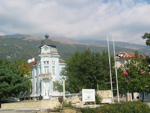 Karlovo is the birth-town of the sculptor Professor Ivan Lazarov, the creator of Bulgarian Teatre-Ivan Popov, Pesho Radoev-the founder of the ballet in the country, the notable actors Vassil Kirkov and Elena Snejina, the artist-ceramist Georgi Bakardjiev, the alpinist Hristo Prodanov, Ivan /John/ Nochev-rocket constructor, Anka Lambreva-the first Bulgarian to travel around the world. Karlovo is the birth-town of the sculptor Professor Ivan Lazarov, the creator of Bulgarian Teatre-Ivan Popov, Pesho Radoev-the founder of the ballet in the country, the notable actors Vassil Kirkov and Elena Snejina, the artist-ceramist Georgi Bakardjiev, the alpinist Hristo Prodanov, Ivan /John/ Nochev-rocket constructor, Anka Lambreva-the first Bulgarian to travel around the world. |
| Назад |


